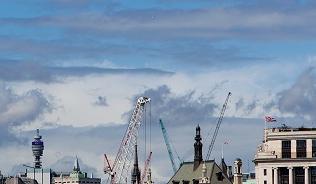George Monbiot’s recent attack on biodiversity offsetting misses the point of the scheme and undermines the work of the scientists who developed it. It is not the principle of placing a value on what nature does for us that is the problem; it is the recent interpretation of value that is at fault.
Firstly, let’s explore the well-debated ‘price on nature’ argument. We all value things in the decisions we take, be that implicitly or explicitly. We do so in ways that may be monetary but are most often not. Importantly, if we omit to value things, the default value in political calculations is zero. This legacy of Industrial Revolution thinking is still substantially embodied in the market and governance systems that run the developed world. Under this calculus, the conversion of resources to generate profit in the short term trumps all other forms of value such as beauty, heritage, tranquillity, genetic inheritance or educational potential, except where we make local accommodations for designated locations and species.
The tendency today is to normalise these different values in monetary terms. For example, to assess the value of an intangible factor such as a sacred place, economic metrics such as the amount people pay to travel to visit it form a common primary basis for valuation. It is a crude metric, granted, but it indicates that something is valued positively or negatively, and to large or small measure.
In answering George Monbiot’s question “Can you put a price on the beauty of the natural world?”… well, yes you can, albeit in indicative rather than absolute terms. The monetary figure is not the value itself; it is merely an indicator to help us bring essentially incomparable values to the negotiating table. However, to conflate this crude approximation of value with real market worth is to fundamentally misunderstand the difference between valuation and accountancy. Take the ‘value of a human life’, a common metric fed into road widening, flood defence and other infrastructure schemes. Each life is given a value, but we would not be happy about selling our children for a penny more than the figure used!
Let’s reframe the question to ask, “What happens if you don’t put some kind of price on the beauty of the natural world?” The answer is that it defaults to zero in decision-making. Recent history shows that this is not a system that protects the natural world, nor the wider importance that people attribute to it. Just think of the forest sell-off debacle!
Where I find myself agreeing strongly with Mr Monbiot is in the ways that governments in general, and the current UK regime specifically, appear to be at best ignorant of the values of nature or, at worst, utterly dismissive of the importance of safeguarding that which remains after centuries of degradation. The UN’s Millennium Ecosystem Assessment and the UK’s National Ecosystem Assessment highlight how our history of resource degradation has undermined prospects for human wellbeing, ranging from basic health and wellbeing through to quality of life and economic opportunity. Governments have signed up to taking novel approaches to reform public policy and business activities, better to reflect the many fundamentally important values provided by the natural world which have been largely ignored over recent centuries to our net cost.
If we consider the costs inevitably borne by those not making immediate profit, particularly by younger and future generations, the current dominant political mantra is revealed essentially as one of liberalisation from ‘green tape’ to drive largely unreconstructed Thatcherite/Reaganomic economic exploitation justified under ‘austerity measures’. This devalues a century and more of progressive integration of more of the values provided to us by the natural world, and enjoyed by wider constituencies of society. It is also diametrically opposed to commitments made under the 2011 Natural Environment White Paper, the Convention on Biological Diversity, EU Biodiversity 2020, and of course the longer term interests of all, which seem to be being surrendered left, right and centre in the headlong pursuit of short-term profit. Monbiot’s example of Smithy Wood near Sheffield, an ancient ecosystem with countless ecological and cultural meanings yet apparently equated with 60,000 trees planted across 16 hectares of local land, is apposite. The most generous thing that can be said for this misplaced watering down of the concept of ‘Biodiversity Offsetting’ is that it is at least one step more enlightened than thinking of the wood as merely equivalent to a timber stack at the local builder’s merchant.
Biodiversity Offsetting (introduced in the Natural Environment White Paper noted above) is not itself fatally flawed. Society has to find creative means to address the challenge of housing, feeding and meeting a host of other demands from the ten million more people who will populate the UK and the 2-4 billion additional people setting foot on the planet by the middle of this century. We will have to find ways to make space for nature, integrating it into adaptive urban settlements and rural land uses rather than hiding it behind barbed wire in ever more fragmented parcels of ‘protected land’. So there will be an uncomfortable yet unavoidable need to achieve, at worst, zero sum and, at best, net positive biodiversity outcomes where development occurs. The bottom line is that, as stated in the very first bullet point of the Executive Summary of the Natural Environment White Paper, “…people cannot flourish without the benefits and services our natural environment provides”.
The problem arises when nature itself is commoditised rather than truly valued for the diverse benefits it confers upon us. Ronald Reagan’s simplistic articulation “a tree is a tree” carries with it no concept of species, health, antiquity, geographical location, connected ecosystems and a host of value to society ranging from carbon sequestration, shade, shelter from winds, and a place to learn and for lovers to carve their initials.
Returning to the central tenet of the introductory paragraphs: the default is zero, so we had better find politically resonant ways to express the many different forms of value provided by the natural world, in however imperfect a form. In politics, altruism alone just hasn’t cut it to date! If economic values are the best we have got today, let’s use them, whilst at the same time holding our political decision-makers to their obligations to take full account of the wide breadth of values that nature provides to society, including those yet unborn. That is, after all, their stated commitment.
Opinions expressed in blogs are the author's own and not those of the IES.





